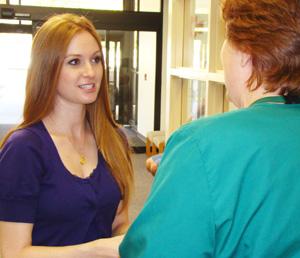
By Celine Klosterman
CLINTON – With the help of local churches, Mercy Medical Center aims to more quickly connect terminally ill people with hospice care — and the spiritual ministry that care provides.
In the new Watchman program, church members serve as links between the medical center and their congregations, letting fellow parishioners know about hospice care’s availability and benefits. “Their duty is to be a resource in their parish,” said Sarah McCool, program director at Mercy Homecare and Hospice and a member of St. John Vianney Parish in Bettendorf.
“We started the program because we realized there was a real gap in knowledge of what hospice is and what it’s about.” Often, families don’t discover or take advantage of resources for a terminally ill loved one until the last few days of the relative’s life, according to the medical center. “Almost always, people say, ‘I wish we had known about this sooner,’” McCool said.
Hospice care takes place in a person’s residence and provides a nurse, social worker, chaplain, volunteer and grief support. At hospice’s foundation is spiritual ministry, McCool said.
“In biblical times, Jesus’ followers were mandated to care for the sick and dying. And we wanted to link the ministry of hospice with the ministry of the Church.”
So far, members of two Catholic parishes are taking part — Prince of Peace Parish in Clinton and Immaculate Conception Parish in Fulton, Ill.
“I believe hospice care is a tremendous and needed service because it can bring peace and comfort to both patients and family members,” said Polly Bukta, Prince of Peace’s Watchman representative. “The journey from temporal life into eternity is the most solemn and sacred part of living. As a trained hospice volunteer I have the rare privilege of associating with a team who cares for hospice patients with such dignity and compassion.” A 14-year representative in the Iowa Legislature and a former teacher, she feels called to service and appreciates the opportunity to “give back” – especially to people who may be nearing their life’s end.
Bukta said she has talked with a few parishioners about hospice, put brochures in the church and had notices published about the Watchman program in Prince of Peace’s bulletin. “I consider this program an extension of the Church’s role in the community.”
If the program results in earlier use of hospice care, as hoped, a chaplain and all hospice staff will have more time to build relationships with dying people, according to Deacon Ray Hilgendorf, a Catholic chaplain.
“To be able to talk to someone about God’s love and mercy as they transition through the process of natural death is very important,” he said. “But if you have only an average of a few days or less to converse with patients on this most personal and sacred topic after their admission to hospice, it remains difficult to build this most effective pastoral relationship.”
Whenever patients are admitted, Deacon Hilgendorf appreciates the role he’s able to play as they near the beginning of their eternal lives. “I find it very humbling and rewarding to be admitted into a person’s life and home at such an important time. People trust you to intimately pray with them. It is an absolute gift. You think of birth as a beautiful event, and it is, but death is also a beautiful event. You are blessed to be present with another soul that is only seconds away from the eternal presence of God.”
To find out more about the Watchman program or to recommend someone to serve as a representative, call McCool at (563) 244-3766.








